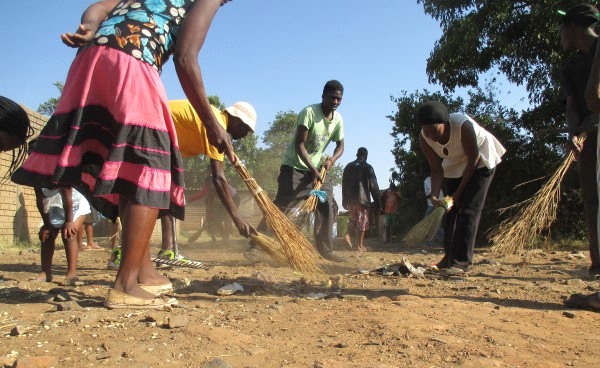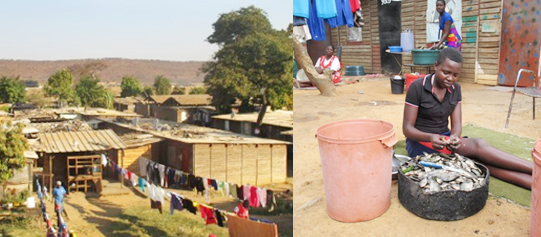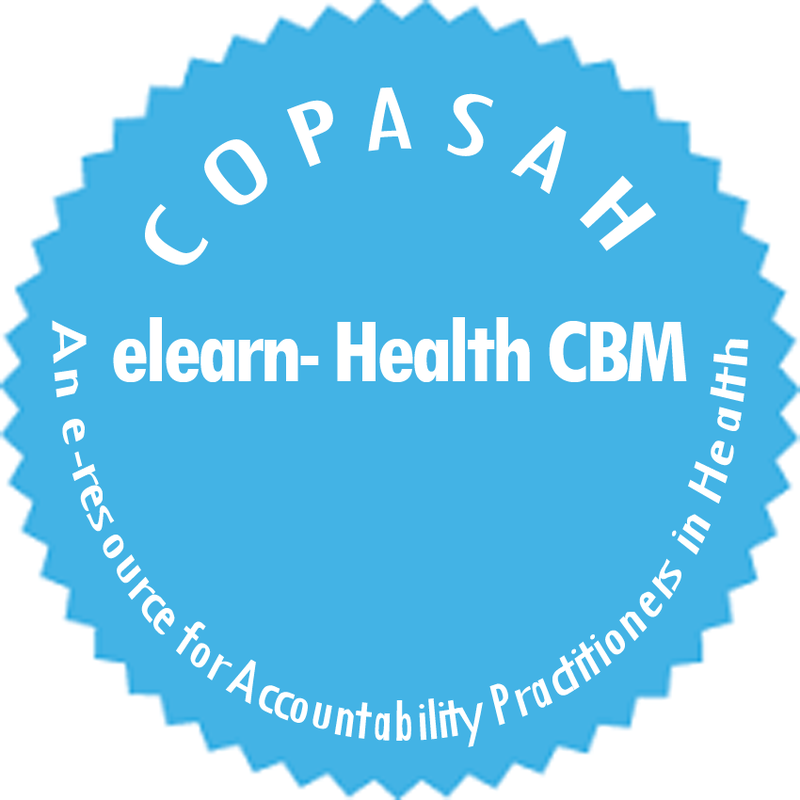
|
|
A Story in Words and Images from Cassa Banana Informal Settlement, Zimbabwe
|
TARSC, ZIMBABWE, CBCHC AND COMMUNITY PHOTOGRAPHERS
|
|
Background
In the earlier issues of COPASAH Communique, the Training and Research Support Centre (TARSC) and Zimbabwe Association of Doctors for Human Rights (ZADHR) reported on how Participatory Action Research (PAR) was used in the Cassa Banana community to explore, analyze and take action on priority health problems faced by the community. PAR activities led to the formation of a Community Health Committee (CHC) and the development of a community action plan that prioritized lack of clean water and poor sanitation as the key health problem in the area. Initially, the CHC focused on clarifying the confusion in roles and responsibilities between two district councils, both of whom denied responsibility for supporting Cassa Banana. More recently, the CHC has focused on organizing community actions and engaging with the relevant duty bearer in demanding the delivery of basic services, including access to health services, waste collection, and the improvement of sewage and water supplies. |
Keeping our community clean
|
|
Cassa Banana is one of many informal settlements that have sprung up around Harare, the capital of Zimbabwe, over the last 20 years or more. In most cases, these unplanned urban settlements are overcrowded, lacking in basic infrastructure and services, with poor environmental conditions for health. Residents are facing a range of other social and economic challenges common throughout the country, including rising urban poverty, falling access to improved water and sanitation, and lack of overall growth in the economy, employment or household incomes post 2013 (TARSC and MoHCC Zimbabwe Equity Watch 2014). The current Public Health Act has provisions for addressing water and sanitation but these are poorly implemented with an underfunded public health system. Diarrhoea, intestinal infections and periodic outbreaks of cholera are not unusual in settlements such as Cassa Banana.
|
Despite these challenges, there are opportunities for health and social accountability. The right to health care, water, food and shelter was included in the new Constitution of 2013. Zimbabwe has seen improvements in the Human Development Index mainly due to better health and HIV outcomes, as there is sustained gender parity in education. Improvements in health and wellbeing in Zimbabwe depend, among other things on engaging with the strong social assets within and improving dialogue between communities, state and private sector, in raising and addressing barriers to resources and services for health, and in supporting community efforts to define and act on problems in order to transform their own environments.
Within this context, the work in Cassa Banana is building a body of knowledge on strategies to support community efforts to take action and on how to hold duty bearers accountable. As part of this process, in October 2015, nine community members were trained as community photographers using a PAR tool called Photovoice.
The photographers took hundreds of photographs reflecting the lives and struggles in their community. They then self-edited the photographs to be included it in a 12-page advocacy booklet that described their community. It showcases challenges in the community and the community's response to it. The treatise ends with a request for support from the public and private sectors.
Over the last few months, the booklet has been distributed to many public and private partners. It is too early to assess the success of the booklet in garnering support for Cassa Banana, but it is already evident that the very process of taking the photos capturing the many lives of the community has generated an interest in exploring a number of questions related to the use of Photovoice as a medium of advocacy. Some of the questions include are: Has the process of taking and using the photos deepened understanding of underlying conditions at community level? Has it changed relations and/or levels of organizing between community members (both photographers and non-photographers)? And what impact has use of the booklet had in facilitating changes in interactions with duty bearers? Cassa Banana and partners will be reflecting on these questions in the coming months. Discussions will deepen our collective understanding of the potential of Photovoice as a tool for change.
Cassa Banana Case study reflecting community engagement through photostories as developed by community photographers.
Within this context, the work in Cassa Banana is building a body of knowledge on strategies to support community efforts to take action and on how to hold duty bearers accountable. As part of this process, in October 2015, nine community members were trained as community photographers using a PAR tool called Photovoice.
The photographers took hundreds of photographs reflecting the lives and struggles in their community. They then self-edited the photographs to be included it in a 12-page advocacy booklet that described their community. It showcases challenges in the community and the community's response to it. The treatise ends with a request for support from the public and private sectors.
Over the last few months, the booklet has been distributed to many public and private partners. It is too early to assess the success of the booklet in garnering support for Cassa Banana, but it is already evident that the very process of taking the photos capturing the many lives of the community has generated an interest in exploring a number of questions related to the use of Photovoice as a medium of advocacy. Some of the questions include are: Has the process of taking and using the photos deepened understanding of underlying conditions at community level? Has it changed relations and/or levels of organizing between community members (both photographers and non-photographers)? And what impact has use of the booklet had in facilitating changes in interactions with duty bearers? Cassa Banana and partners will be reflecting on these questions in the coming months. Discussions will deepen our collective understanding of the potential of Photovoice as a tool for change.
Cassa Banana Case study reflecting community engagement through photostories as developed by community photographers.
INTRODUCING CASSA BANANA
Produced by the Cassa Banana Community Health Committee and Community Photographers
Produced by the Cassa Banana Community Health Committee and Community Photographers
|
Cassa Banana is an informal settlement situated about 28 kms from Harare, with a population of about 850 people. The photograph below was taken from the roof of our communal ablution block. It shows how residents in our community live in one or two-roomed wooden cabins.
We pay USD 17.00 a month per room to the Harare City Council (HCC). This covers the rent, water and sewage rates, but not all of us can afford to pay the City Council fee. Most of the residents in Cassa Banana are unemployed. We live by growing food, selling fish which we get from Lake Chivero a few kilometres away, providing services such as hairdressing or carpentry, or through selling vegetables, meat and other goods we get from town. Some of us also manage to find part-time work in the surrounding farms. |
|
The water and sanitation crisis is our top priority in Cassa Banana. We have serious problems with burst water pipes and a blocked sewage system. Most of our municipal water taps have not been properly repaired or replaced in a long time so we now only have five working water taps for 850 people. And sometimes the sewage seeps into our water supply through the broken water pipes. As a result, the sewage is polluting our drinking water.
We are trying to keep our communal toilets and surrounding areas clean but this is difficult when the toilet flushing system is not working well due to corroded piping, we have no cleaning materials and no metal bins to throw away our rubbish. The council trucks used to come to Cassa Banana once a week to collect our rubbish, but they haven't come now for many years. So, we dig communal rubbish pits, but these fill very quickly.
In such an environment, it is not surprising that we have related health problems, such as intestinal parasites and diarrhea.
So, what are we doing about this situation?
For many years, we have been fixing our water leaks, clearing out our overflowing sewage tanks, cleaning our ablution blocks, digging rubbish pits, and organizing community cleanup campaigns. The CHC developed an Action Plan in 2014 and this has helped prioritize our work. We hold regular community meetings and, because the nearest public health clinic is 20kms away, we have strengthened our relationship with a private health clinic close by. This year they provided us with deworming tablets.
We are in contact with the Harare City Council and they are aware of our problems. The council members mentioned their challenges of keeping up with the overall situation in Greater Harare, but nonetheless have assured the community of providing labour and technical knowhow if we can supply the plumbing materials. This goes against the constitutional obligations of the Government in providing the basic essentials to the citizens. One wonders at the financial accountability of the government as we are unsure where the 17 USD per month rent from every household that is collected goes.
At the end of 2015, the CHC members and community photographers came together to discuss our plans for the coming year. We decided to continue to organizing ourselves and do whatever it takes to improve our environment. At the same time, we need to continue engaging with the Harare City Council in demanding that they provide health and other services as is our constitutional right. It is also important that we develop new partnerships that help us network with other communities and organizations in getting our health and other basic rights met; to share our experiences and learning with others, and to learn from them.
We are proud of the photos we took last year and are happy with the advocacy booklet we produced. There is still more to do, and many other ways that we can use these photos. We understand that the photographs alone do not create the change we want. These images will be used as evidence for the change that is needed.
All photos are copyrighted to the Cassa Banana Community Photographers: Leeroy Dhumukwa, Paradzai Dimingo, Dephine Hondongwa, Misheck Mharadze, Martin Musodza, Mitchell Ncube, Talkmore Rwanyanya, Pamela Wachipa and Ruth Waeni.
We are trying to keep our communal toilets and surrounding areas clean but this is difficult when the toilet flushing system is not working well due to corroded piping, we have no cleaning materials and no metal bins to throw away our rubbish. The council trucks used to come to Cassa Banana once a week to collect our rubbish, but they haven't come now for many years. So, we dig communal rubbish pits, but these fill very quickly.
In such an environment, it is not surprising that we have related health problems, such as intestinal parasites and diarrhea.
So, what are we doing about this situation?
For many years, we have been fixing our water leaks, clearing out our overflowing sewage tanks, cleaning our ablution blocks, digging rubbish pits, and organizing community cleanup campaigns. The CHC developed an Action Plan in 2014 and this has helped prioritize our work. We hold regular community meetings and, because the nearest public health clinic is 20kms away, we have strengthened our relationship with a private health clinic close by. This year they provided us with deworming tablets.
We are in contact with the Harare City Council and they are aware of our problems. The council members mentioned their challenges of keeping up with the overall situation in Greater Harare, but nonetheless have assured the community of providing labour and technical knowhow if we can supply the plumbing materials. This goes against the constitutional obligations of the Government in providing the basic essentials to the citizens. One wonders at the financial accountability of the government as we are unsure where the 17 USD per month rent from every household that is collected goes.
At the end of 2015, the CHC members and community photographers came together to discuss our plans for the coming year. We decided to continue to organizing ourselves and do whatever it takes to improve our environment. At the same time, we need to continue engaging with the Harare City Council in demanding that they provide health and other services as is our constitutional right. It is also important that we develop new partnerships that help us network with other communities and organizations in getting our health and other basic rights met; to share our experiences and learning with others, and to learn from them.
We are proud of the photos we took last year and are happy with the advocacy booklet we produced. There is still more to do, and many other ways that we can use these photos. We understand that the photographs alone do not create the change we want. These images will be used as evidence for the change that is needed.
All photos are copyrighted to the Cassa Banana Community Photographers: Leeroy Dhumukwa, Paradzai Dimingo, Dephine Hondongwa, Misheck Mharadze, Martin Musodza, Mitchell Ncube, Talkmore Rwanyanya, Pamela Wachipa and Ruth Waeni.
ABOUT THE AUTHOR
This article is based on an advocacy booklet produced in November 2015. It was written by the Cassa Banana Community Health Committee, with support from Barbara Kaim, Training and Research Support Centre (TARSC) Zimbabwe. TARSC is a learning and knowledge organisation, with a strategic vision to inform and contribute to people and social justice change and to support sustained health and wellbeing. See www.tarsc.org for more information or [email protected].
For more information about how PAR and Photovoice have been used in Cassa Banana, see
ttp://www.equinetafrica.org/sites/default/files/uploads/documents/EQPRA%20Cassa%20Banana%20April%202016.pdflobal
This article is based on an advocacy booklet produced in November 2015. It was written by the Cassa Banana Community Health Committee, with support from Barbara Kaim, Training and Research Support Centre (TARSC) Zimbabwe. TARSC is a learning and knowledge organisation, with a strategic vision to inform and contribute to people and social justice change and to support sustained health and wellbeing. See www.tarsc.org for more information or [email protected].
For more information about how PAR and Photovoice have been used in Cassa Banana, see
ttp://www.equinetafrica.org/sites/default/files/uploads/documents/EQPRA%20Cassa%20Banana%20April%202016.pdflobal










